|
|
|
Sort Order |
|
|
|
Items / Page
|
|
|
|
|
|
|
| Srl | Item |
| 1 |
ID:
182451
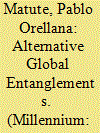

|
|
|
|
|
| Summary/Abstract |
While the call for broader conceptions about the political in general, and International Relations in particular, points to the need to redirect attention to the entanglements of societies, species and environments, in this article I address the way in which this proposed shift might still be reproducing anthropocentric understandings of global politics if serious attention is not devoted to the ontological foundations of the discipline. To do so, I first engage in a problematisation of decolonial efforts drawn from the Latin American experience that stress knowledge diversification as a means to emancipation. I then attempt to demonstrate that an exclusive intellectual engagement with entanglements and detachments might also be misleading, for their conventional conception is dependent on certain ontological commitments inherent to knowledge production, namely mind-world dualism and the linear conception of time. I therefore propose the notion of ‘detachment from knowledge’ as an alternative ontological practice through which IR students can themselves grapple with the dualist and anthropocentric oppressor/victim logic at the root of any emancipatory project. Such practice, I finally argue, not only allows us to understand the ‘global’ as indivisible, but also to engage with it beyond the exclusive pursuit of emancipation through knowledge, however diverse or decolonial it might be.
|
|
|
|
|
|
|
|
|
|
|
|
|
|
|
|
| 2 |
ID:
188858
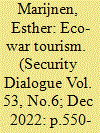

|
|
|
|
|
| Summary/Abstract |
This article introduces ‘eco-war tourism’, a growing niche in which tourists venture into war zones to seek adventure and ‘save’ nature from its violent surroundings. In Virunga National Park in eastern Democratic Republic of Congo, such tourists can experience the ‘threat of mortality’ while visiting mountain gorillas, contribute to the survival of the park and supposedly participate in regional peacebuilding. This article considers how the amalgamated commodification of war and gorillas leads to the bunkerization of tourism, the reconfiguration of space into ‘safe’ and ‘dangerous’ areas and the militarization of conservation. It links critical security studies and political ecology to theorize how eco-war tourism intensifies green militarization and how militarized conservation itself becomes a spectacularized tourist attraction. Eco-war tourism is informed by, and productive of, various affective geographies, entrenched in colonial durabilities that produce Eurocentric ideas about how and by whom nature should be protected. I call for critical security studies to examine how diverse security interventions – e.g. military, tourism, humanitarianism and conservation – are entangled in and reconfigure inherently political nature–society relations and underscore the futility of approaching ‘society’ and ‘the environment’ as separate fields of security.
|
|
|
|
|
|
|
|
|
|
|
|
|
|
|
|
| 3 |
ID:
157518
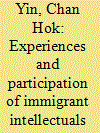

|
|
|
|
|
| Summary/Abstract |
This study examines the experiences of two generations of intellectuals that migrated to Hong Kong in 1919 and 1949.* The earlier generation included the former Qing remnants Lai Jixi (賴際熙) and Chen Botao (陳伯陶), and the latter included Tang Junyi (唐君毅), a prominent advocate of Neo-Confucianism. Although they shared a similar ethnic pride, they developed divergent attitudes about the colony of Hong Kong. The former Qing remnants all harmoniously related with the local Chinese elites and businessmen in Hong Kong and, thus, successfully integrated with the mainstream Chinese community. They maintained their traditional Chinese culture while working together with the colonial government even as the cultural gap between Hong Kong and Mainland China expanded. In 1949, significant political changes caused by the creation of the People’s Republic of China created a second generation of immigrants, including Neo-Confucianist Tang Junyi, who shared similar attitudes about traditional culture with the earlier immigrants. However, they developed totally different ideas about Hong Kong with respect to nationalism and colonialism. Although Tang and other immigrants like him all claimed to be proponents of traditional Chinese culture and to promote orthodox traditions, they also held different ideas about culture. This study investigates how Tang Junyi’s nationalism and critical attitudes towards coloniality developed, while also explaining the limitations of his efforts to re-establish China’s national culture without participating in the local culture. This examination not only facilitates our understanding of how elites and intellectuals in Hong Kong saw Chinese culture through different periods but also helps us reflect on the roles and functions of Hong Kong during the historical and cultural development process.
|
|
|
|
|
|
|
|
|
|
|
|
|
|
|
|
| 4 |
ID:
135036
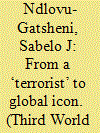

|
|
|
|
|
| Summary/Abstract |
This article examines Nelson Rolihlahla Mandela’s political life and legacy from the perspective of critical decolonial liberation ethics, which privileges a paradigm of peace, humanism and racial harmony and opposes the imperial/colonial/apartheid paradigm of war, racial hatred and separation of races. This system emerged in the 15th century and was driven by the desire to conquer, dispossess, colonise, exploit and segregate people according to race and, alongside imperatives of primitive accumulation, it informed the colonisation of South Africa and the imposition of apartheid. Mandela was a liberation fighter who provided an antidote to the colonial ideology of racial profiling and hierarchisation. What distinguished him from other freedom fighters was his commitment to the cause of human rights as early as the 1960s, long before it attained its status as a constitutive part of global normative order. When Mandela became the first black president of a democratic South Africa, his practical and symbolic overtures to whites and his reconciliatory politics aimed to call them back to a new inclusive humanity. Critical decolonial ethics logically enables a tribute to Mandela that privileges his commitment to a post-racial society and new humanism.
|
|
|
|
|
|
|
|
|
|
|
|
|
|
|
|
| 5 |
ID:
172341


|
|
|
|
|
| Summary/Abstract |
This article proposes a method for analysing museums as sites of intimate and colonially-produced international relations. Beginning with fieldwork that approaches museums as sites through which people intimately encounter the objects, institutions, selves and others of international politics, we explore how intimacy can be ‘read’ as socio-sexual affect, scales and proximities, and colonial differentiation/racialisation. The article is grounded in fieldwork at the British Army Royal Engineers Museum in Kent, UK, conceptualised as an assembly of, following Stoler, imperial debris. We explore how certain museum exhibits work as intimate ‘organising objects’, locating the museum collection, and those who visit or are excluded from it, within the intimate circulations of imperial and colonial violence. The article makes two core contributions: first, responding to recent literature in IR on museums we propose a framework for understanding how museums and exhibitions function as everyday sites of coloniality and racialisation. Second, we propose that approaching intimacy as a method is instructive for fieldwork in international relations (including museums) which takes the colonial constitution of the global/local seriously.
|
|
|
|
|
|
|
|
|
|
|
|
|
|
|
|
| 6 |
ID:
192010


|
|
|
|
|
| Summary/Abstract |
This article brings an intimate perspective to bear upon the violence of economic sanctions, shifting attention away from an exclusive focus on state actors, in order to examine how “‘wounds” enter politics’.1 In this research, I ‘stretch’ Berlant’s notion of the intimate public, reconfiguring it as a decolonial analytic lens on subaltern suffering in conditions of endemic imperial violence. I focus on the Facebook page of the Iranian chief negotiator, Javad Zarif, during Iran’s talks with the P5+1 powers over its nuclear programme, under the pressure of what the Obama administration itself termed ‘crippling’ economic sanctions. Examining Zarif’s audience’s readings of his back injury during the talks as representing the ‘crippled’ nation, I trace how subaltern injury is intimately narrated through a racialised framework of disablement and ‘recovery’, where ‘recovery’ signifies a desanctioned and deracialised national body. I firstly complicate the prevailing conception of the intimate public as oriented around a ‘national fantasy’, theorising it as an affective structure that simultaneously locates imperial power, as well as the nation-state, as sources of complaint and hope; secondly, I draw on a critical disability (‘crip’) lens to understand the intimate public as mediating both the debilitation of racialised underdevelopment, and the fantasy of a normative, ‘developed’ national body in a post-sanctions future. Through examining the intimate politics of economic sanctions, this study contributes to a decolonial perspective on the entanglements of affect, nationalism and imperial violence.
|
|
|
|
|
|
|
|
|
|
|
|
|
|
|
|
| 7 |
ID:
172133
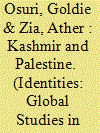

|
|
|
|
|
| Summary/Abstract |
What features of contemporary coloniality emerge if we examine geopolitical alliances across settler and ‘post’ colonial contexts? What forms of solidarity become necessary in the context of these colonialities? Referencing the historical and contemporary features of the occupations of Kashmir & Palestine, the introduction to this special issue makes the case for naming the states of India and Israel as part of a contemporary geocolonial formation. Naming and framing require understanding present forms of coloniality and reflexive solidarity. The essays in this special issue form an archive of coloniality and solidarity through which the authors examine the minutiae of living and of dying, of assembling archives from below, and of building and decolonising solidarities across Kashmir & Palestine.
|
|
|
|
|
|
|
|
|
|
|
|
|
|
|
|
| 8 |
ID:
178132
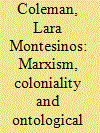

|
|
|
|
|
| Summary/Abstract |
At the heart of Global Capitalism, Global War, Global Crisis is a revolt against fetishism: the appeal to abstract categories, treating concepts as if they referred to things ‘out there’ in the world, independent of social relations). It is commonplace to note that studies of international relations routinely fetishise a system of ‘sovereign’ states, abstracted from history and the social relations, practices and ideologies that sustain state power. What Bieler and Morton emphasise is that even ‘Left’ analyses routinely make fetishistic appeal to concepts – ‘the state’, ‘the market’, ‘security’, ‘production’, ‘finance’, ‘knowledge’ – which are treated as things-in-themselves, devoid of human beings in their concrete social relations.1 Despite some scholars’ careless applications of the label ‘Marxist’ to such work, Bieler and Morton’s critique is very much in line with Marx’s own critique of a tradition of classical political economy so beholden to the modern obsession with uniformity and universality that it forcibly read history through the categories of bourgeois ideology (abstract individuals interacting in ‘the market’ and so on) that were made to look like ‘general preconditions of all production’
|
|
|
|
|
|
|
|
|
|
|
|
|
|
|
|
| 9 |
ID:
185080
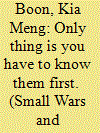

|
|
|
|
|
| Summary/Abstract |
This article critically examines the models of protest policing deployed by the Malaysian police during the BERSIH 2.0 wave of protests (2011–2016). Based on participant observation and critical ethnography of these protest events, it explains how the state and police adapted to the surge of street protests in Kuala Lumpur by bringing together various elements of policing practices in its attempt to contain dissent on the streets. I argue that the new ‘Peaceful Assembly assemblage’ of policing practices, though distinct and significantly different in its overall governing logic compared to its predecessor, it remains heavily connected to late colonial forms of public order and counterinsurgent policing, especially the Special Branch and the Federal Reserve Unit (riot police). In this sense, the article shows that colonial policing’s afterlife is a major factor for understanding how Malaysia’s protest policing experience complicates and departs from patterns of protest policing development observed in the Global North.
|
|
|
|
|
|
|
|
|
|
|
|
|
|
|
|
| 10 |
ID:
153672
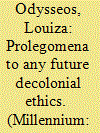

|
|
|
|
|
| Summary/Abstract |
Decolonial thought has wrought a devastating critique on the Academy and wide-ranging fields within it. Decolonial critique entails undeniable and multiple ethico-political orientations arising from concrete struggles within the ‘unfinished project of decolonization’ (Maldonado-Torres), as well as recent articulations of decolonial ethics. This article argues that, as decolonial critique, and calls for decolonial ethics, begin to find their way into broader theoretical discussions in the social sciences and humanities, it may be more fruitful to insist on the question of decolonial ethics. It encourages retaining the disruptive potential of decolonial critique by resisting its immediate translations into available ethical registers and traditions that unwittingly reassert, and remain bound to, forms of ethical expression dependent on generalised narratives, which occlude their histories of violent and racialised exclusion and masterful figurations of ethical subjectivity. Outlining Sylvia Wynter’s excavation of prominent figurations of the human as ‘Man’, I argue that our conceptions of ethical subjects too rest on such figurations. The article, therefore, discusses three prolegomena to any future decolonial ethics: the decolonial critique and displacement of the figure of ‘Man’ as ethical subject within racialised coloniality; the development of a decolonising poetics, whose ethos of irreverence seeks forms of poetic revolt that draw on struggles to question systems of ethical thought and knowledge; finally, a discussion of the contours of a praxis of being hybridly human through the development of ‘education’ as an incessant and ‘unfinished’ project.
|
|
|
|
|
|
|
|
|
|
|
|
|
|
|
|
|
|
|
|
|